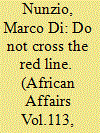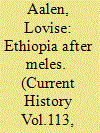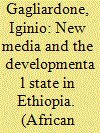| Srl | Item |
| 1 |
ID:
133105


|
|
|
|
|
| Publication |
2014.
|
| Summary/Abstract |
Only five years after it lost a national election in Addis Ababa, the overwhelming victory of the Ethiopian People's Revolutionary Democratic Front (EPRDF) in the 2010 general elections marked the defeat of the opposition parties and the return to a dominant-party state. The capacity of the EPRDF to mobilize people in towns and the capital city triggered debates on the nature of consent in urban Ethiopia. This article contributes to this debate in two ways. First, it maps the specific institutions and strategies the ruling party has used to close political space in the capital since 2005, explaining how it has tied political mobilization to the delivery of services to those at the bottom of urban society. Second, it examines interactions between the ruling party and young people involved in government development programmes and youth organizations, demonstrating the subtle ways dissent is expressed even as EPRDF power is reproduced. In this regard, the victory of the ruling party in 2010 does not bear witness to the neutralization of dissent. Rather, it reveals a reshaping of the way the government has governed and controlled the city since the late 1990s.
|
|
|
|
|
|
|
|
|
|
|
|
|
|
|
|
| 2 |
ID:
130219


|
|
|
|
|
| Publication |
2014.
|
| Summary/Abstract |
When Meles Zenawi, the national and ruling party leader for 21 years, died in August 2012, most observers predicted that Ethiopia would be thrown into an uncertain transition and put in great danger by
destructive internal power struggles and external pressure. As the months went by, none of these things happened. Instead, the world witnessed a peaceful succession, and a calm status quo has been maintained under the new prime minister, Hailemariam Desalegn.
|
|
|
|
|
|
|
|
|
|
|
|
|
|
|
|
| 3 |
ID:
133252


|
|
|
|
|
| Publication |
2014.
|
| Summary/Abstract |
The Ethiopian government, led by the Ethiopian People's Revolutionary Democratic Front (EPRDF), has developed one of the most restrictive systems for the regulation of new media in Africa. So far, most discussion has focused on the measures employed by the EPRDF to prevent the Internet and mobile phones from becoming tools for opposition forces to challenge the regime. Much less attention has been paid to the strategies pursued in order to make new media work in support of the government's ambiguous but ambitious attempt to make Ethiopia a developmental state. Examining the period between 1991 and 2012, this article explores how the EPRDF gradually moved from a simple strategy of information control towards incorporating new media into its state- and nation-building efforts through large-scale projects such as Woredanet and Schoolnet. Larger trends at the international level, including the securitization of development and the growing significance of China in Africa, have legitimated the use of the media to serve development outcomes, and have facilitated the spread of the kind of 'developmental media system' that has emerged in Ethiopia. The article concludes that only by engaging with these systems on their own terms and "going with the grain" can we develop a better understanding of how they work and how to change them.
|
|
|
|
|
|
|
|
|
|
|
|
|
|
|
|